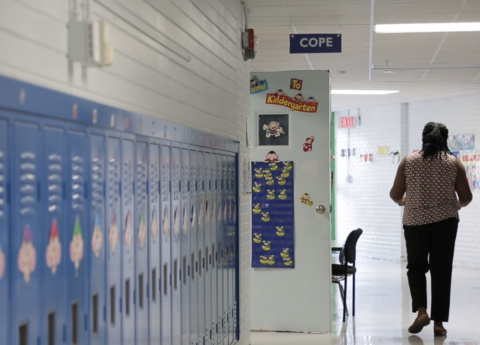Kentucky still has a lot of work to do to make sure all students can thrive, but taking money out of public schools and diverting it to private entities and private schools in eight counties as set forth in House Bill 563 (HB 563) is not aligned with the constitutional mandate to provide an efficient system of common schools throughout the state.
HB 563 sets up a costly system of unaccountable private educational intermediaries
Under HB 563, private educational intermediaries called account granting organizations (AGO) will be given $25 million in diverted public resources at full implementation of the program. Duplicating administrative structures already in place in our public school system that assess funding needs statewide, these privately controlled entities will decide who gets what among a small subset of students from families most well-positioned to coordinate educational alternatives.
Before the AGO spends a single dollar on students, they can spend 10% of funding on employee salaries, benefits and other broadly defined expenses. They can also develop a large and growing carryforward of public resources and contract with financial management firms. It is not hard to imagine that we will see pressure in future years to expand the pot of monies available to AGOs.
Program resources will flow to private schools with a focus on the eight biggest counties
HB 563 now allows the monies to go to tuition and fees at private schools in the largest counties: Jefferson, Fayette, Kenton, Boone, Campbell, Hardin, Daviess and Warren counties. In essence, the bill will take $25 million from the entire state and channel it to private schools in the state’s most affluent localities, leaving rural, lower-income communities behind.
In Kentucky’s 112 other counties, funds will be diverted to expenses at private schools besides tuition – on uniforms, textbooks and other instructional materials, curricula, hardware and software, tutoring, educational therapies, afterschool and college test prep courses, for example.
Legislators from more rural communities are rightly concerned about the ability of AGOs to target resources to particular communities. While the bill prevents an AGO from accepting donations for particular students, there is no prohibition on donations for specific families, parishes, private schools or communities. Under HB 563, an AGO only has to work with two education service providers and administer 50 accounts – clearly allowing resources to be targeted to a particular community. And while it was said in the Joint Appropriations and Revenue Committee meeting on HB 563 that a student from another community could apply to any AGO, the AGO “may define and limit the services that the EOA funds may cover.” More generally, the state has little authority over AGOs and the service providers they work with.
Wealthy donors to AGOs – who can actually turn a profit off of donations of up to $1 million a year due to tax implications – will essentially be able to decide which communities get public resources, regardless of where they are needed most across the state.
Program resources won’t flow to those most in need
HB 563’s eligibility threshold is so generous that 63% of Kentucky children would be eligible on a first time basis, with resources prioritized for past recipients even if their income has grown to a whopping 463% of poverty. And while HB 563 would means-test the amount of funds students receive, for one set of students it leaves it up to the educational intermediaries to define the means test, and for the other set it would allow a family of 4 with $121,175 in income to receive $2,960 in public resources annually.
Research shows that the most affluent students eligible for these kinds of programs tend to benefit from them, with families who are often already paying for educational alternatives receiving state subsidies. That’s because families with means face the fewest barriers to applying to, complying with and participating in these programs. Parents in rural communities with access to fewer educational alternatives, those who work two or more jobs, who can’t afford to homeschool, and have limited access to internet and transportation face more barriers.
Public resources should stay in schools that are accountable to equity standards
Passing 563 will lead to wasteful, inequitable use of public funds by private entities, all while public school students, especially in low-income districts, have suffered the consequences of more than a decade of state funding cuts. HB 563 will allow those public resources to be spent by entities that do not have the same legal mandate to serve students no matter where they live, and to protect students from discrimination based on having special needs, their LGBTQ status, race, religion or being an English language learner, for instance.
The Kentucky Education Reform Act, with its equalizing funding formula and large infusion of additional resources especially into low-income districts, demonstrably improved outcomes for students in poorer communities. The best use of public resources toward improved outcomes for students in underserved communities is to reinvest in our public schools and in struggling students. To help all Kentucky students, the legislature should keep public funds in public schools.




